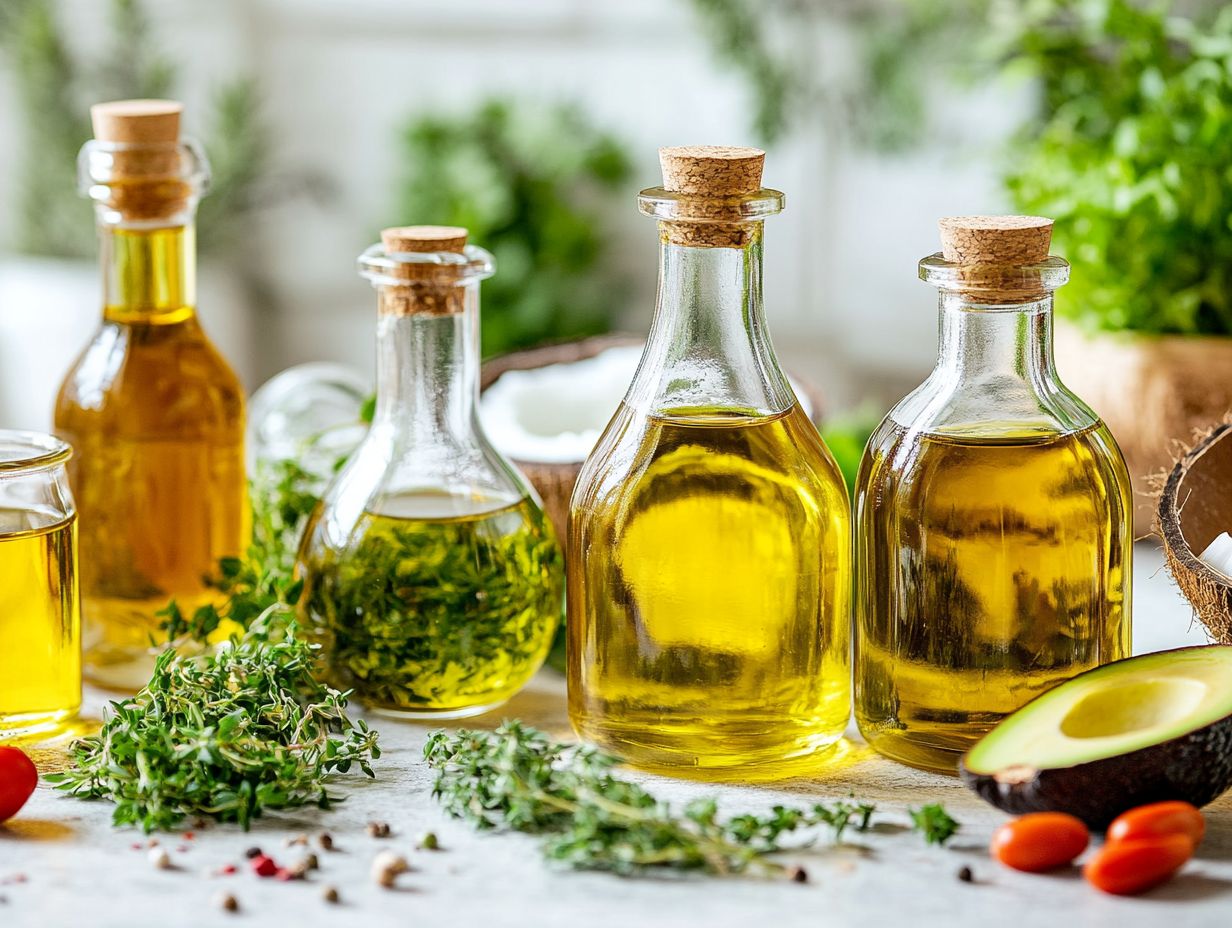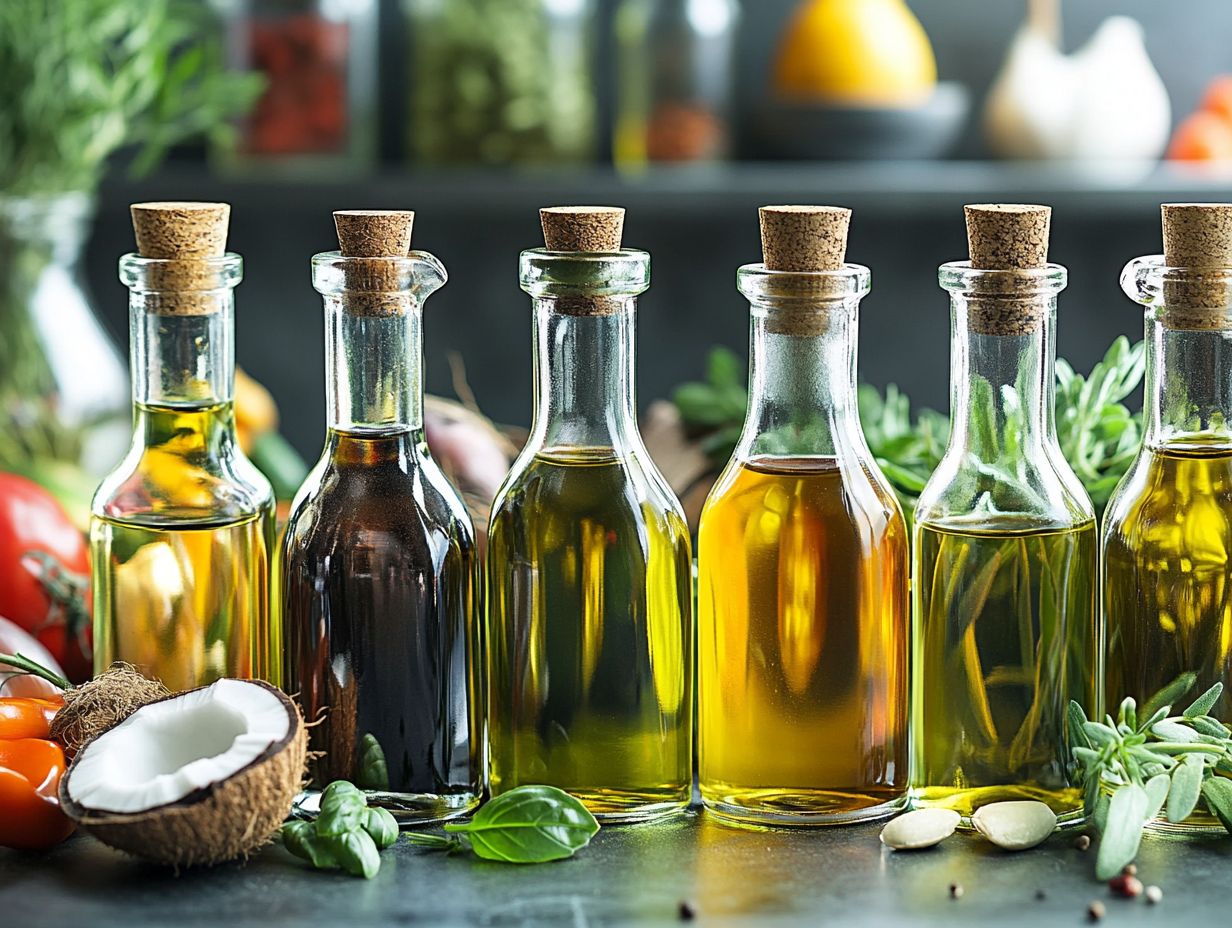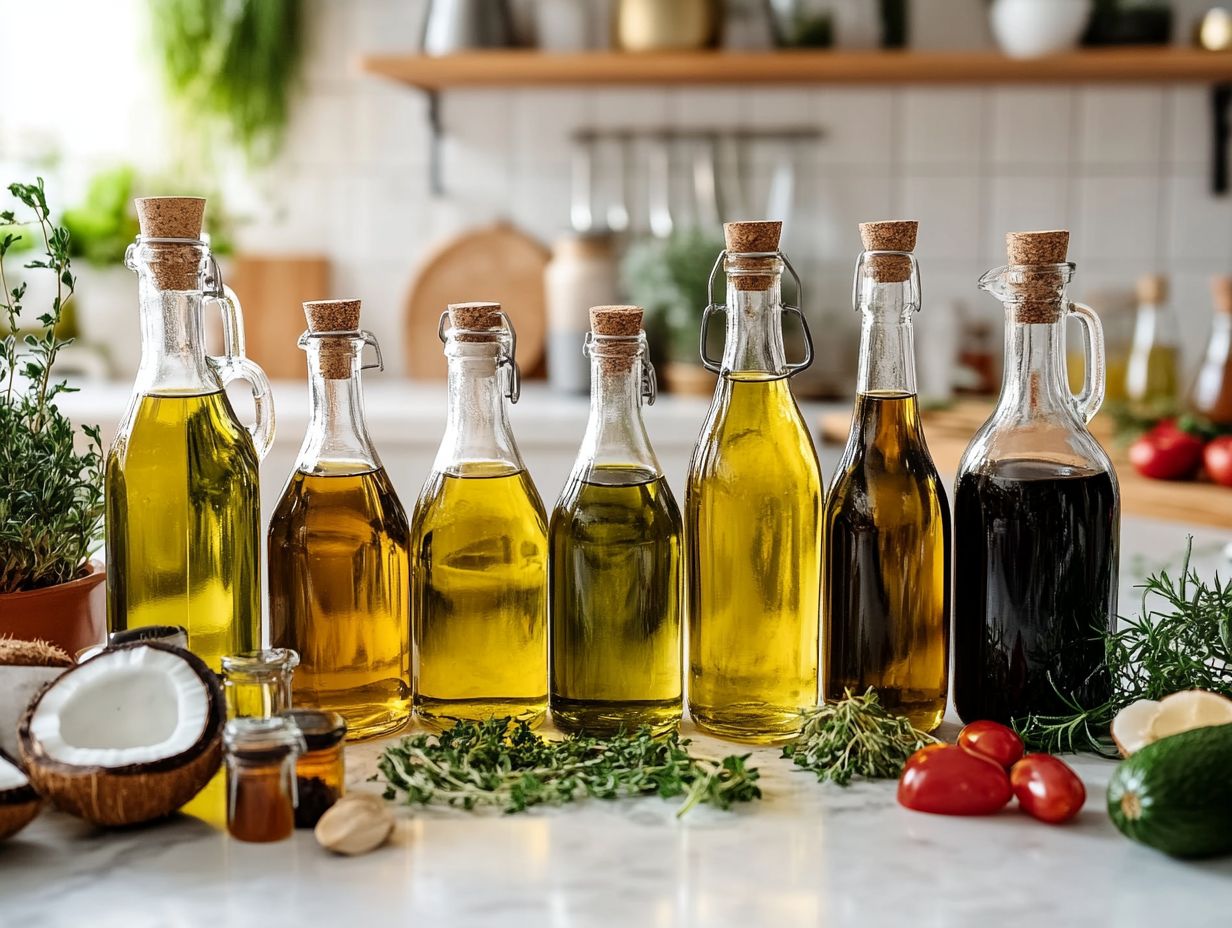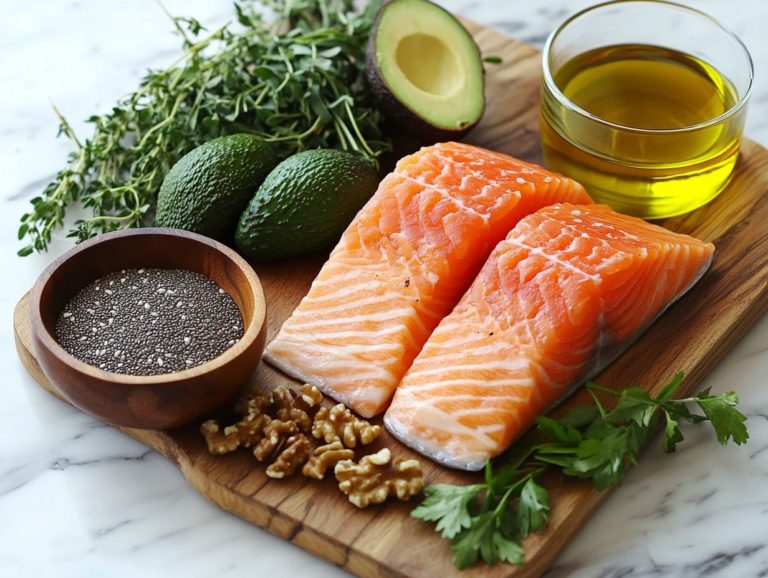How Do I Choose Healthy Cooking Oils?
Choosing the right cooking oil can have a profound impact on both your health and the flavors of your meals. With many options at your fingertips, it’s crucial to grasp what truly qualifies as a “healthy” oil.
Get ready to explore the exciting world of cooking oils! This article examines the various types of cooking oils, exploring their smoke points, nutritional values, and unique health benefits. You ll uncover practical tips and recipes that will allow you to effortlessly integrate these oils into your diet, transforming your cooking into a delightful blend of nutrition and flavor.
Jump in and transform your cooking today!
Contents
Key Takeaways:

Look for oils with high smoke points and nutritional value to avoid harmful byproducts and get the most health benefits.
Different oils have unique health benefits, so choose oils based on your needs and preferences.
Incorporate healthy oils into your diet through various cooking methods and recipes for a well-rounded and nutritious diet.
Understanding Healthy Cooking Oils
Understanding healthy cooking oils is crucial in today s health-conscious landscape. The right dietary fats can significantly enhance your overall wellness, while unhealthy fats can take a toll on your heart health.
Healthy cooking oils include a range of options packed with healthy fats, which can lower bad cholesterol levels and elevate good cholesterol. Whether you choose extra virgin olive oil, cold-pressed oils, or other plant-based alternatives, being knowledgeable about the composition of these oils and their associated health benefits gives you the power to make informed culinary decisions.
What Makes an Oil “Healthy”?
An oil is considered healthy based on its fat composition, particularly the balance between healthy fats, like unsaturated fats, and those you want to avoid, such as saturated and trans fats.
Saturated fats, usually solid at room temperature, are often found in animal products like butter and cheese. These fats can elevate cholesterol levels, increasing your risk of heart disease.
In contrast, unsaturated fats come in two forms: monounsaturated and polyunsaturated. Typically liquid at room temperature, these fats are regarded as beneficial for heart health.
Take olive oil, for example it’s rich in monounsaturated fats and is celebrated for its heart-protective qualities. Polyunsaturated fats, commonly found in oils like sunflower and soybean, also offer health benefits, particularly the omega-3 fatty acids sourced from fish oil.
Trans fats, however, which are often present in partially hydrogenated oils, are particularly harmful as they raise bad cholesterol while lowering good cholesterol levels. By understanding these distinctions, you can make more informed choices about which cooking oils to use for a healthier lifestyle.
Types of Cooking Oils
You ll discover a variety of cooking oils at your disposal, each boasting unique properties and culinary applications. From versatile vegetable oils like canola and soybean to premium selections such as extra virgin olive oil and exquisite flavored oils, the options available to you are both diverse and enticing.
Comparing Different Types of Oils

When comparing different types of cooking oils, it s essential to consider factors like oil composition, packaging, and brand reputation. Consider these factors to make the best choices for your cooking.
Each oil brings its own unique flavor profile and culinary capabilities to the table. For example, extra virgin olive oil is celebrated for its robust, fruity taste, making it a fantastic choice for dressings and saut ing. In contrast, a neutral oil like canola is perfect for baking or frying, where you want the oil’s flavor to take a backseat.
Well-known brands like Bertolli offer a variety of olive oils, each with its own taste and suitability for different dishes. Meanwhile, Crisco is recognized for its versatile shortening and baking oils.
Don’t underestimate the importance of reading labels. They reveal not only the oil s purity and processing methods but also highlight potential allergens or added ingredients. This ensures you choose an oil that truly aligns with your culinary intentions.
Act now to enhance your meals! Try out different oils and discover which ones are your favorites.
Considerations When Choosing Cooking Oils
When you re choosing cooking oils, several key factors demand your attention.
Consider the oil’s smoke point, as it can impact your cooking methods. Nutritional value is crucial as it directly affects the health benefits you gain from your meals.
Proper storage techniques are also vital to preserving the oil’s quality and its inherent advantages. Making informed decisions on these aspects will elevate your culinary experience.
Smoke Point and Nutritional Value
The smoke point of an oil is the temperature at which it starts to break down and release potentially harmful compounds. This temperature is crucial for determining the oil’s nutritional value. It also impacts its suitability for different cooking methods.
You’ll find that different types of oils present a remarkable range of smoke points, greatly influencing your culinary creations. For instance, oils like avocado and refined peanut oil have high smoke points, making them perfect for high-heat techniques such as frying and saut ing.
On the other hand, oils like extra virgin olive oil and flaxseed oil have lower smoke points. This makes them better suited for dressings or low-heat cooking. Your choice of oil affects the flavor and texture of your dish and its health benefits.
Understanding these distinctions is essential for anyone looking to elevate their cooking skills to new heights.
Health Benefits of Different Cooking Oils
Delving into the health benefits of various cooking oils uncovers the distinct advantages that healthy fats offer. These oils not only help reduce inflammation but also supply essential antioxidants crucial for your overall well-being.
Specific Health Benefits and Uses

Different cooking oils present unique health benefits and ways to use the oils in cooking, enabling you to customize your oil choices in line with your dietary aspirations and cooking needs.
Take olive oil, for example; it’s renowned for its heart-healthy monounsaturated fats and robust antioxidants that enhance cardiovascular health. Drizzling it over salads or using it to finish a dish is not just a culinary delight it s a healthful choice.
Avocado oil stands out as well, bursting with beneficial compounds that may help reduce inflammation and bolster skin health. Its high smoke point makes it great for stir-frying or high-heat cooking, ensuring your meals are both delicious and nutritious.
Choose cold-pressed or extra virgin oils to boost your meals with maximum nutrition! This ensures you reap the maximum nutritional benefits while steering clear of harmful additives.
By understanding the specific properties and health advantages of different oils, you can make informed decisions that perfectly align with your culinary goals.
How to Incorporate Healthy Cooking Oils into Your Diet
Incorporating healthy cooking oils into your diet can be a delightful and uncomplicated experience. With an array of tips and recipes at your fingertips, you can effortlessly elevate your meals while making nutritious choices.
Tips and Recipes for Using Healthy Oils
Utilizing healthy oils in your daily meals can truly elevate both flavor and nutrition. With just a few simple tips and delightful recipes, you re well-equipped to make healthier choices in the kitchen.
Incorporating oils like olive, avocado, and coconut into various cooking methods can significantly enhance the taste profiles of your everyday dishes.
- For instance, olive oil is excellent for saut ing vegetables or as a finishing touch drizzled over salads.
- Avocado oil, with its high smoke point, is perfect for high-heat cooking techniques like grilling or roasting.
- Meanwhile, coconut oil adds a gentle sweetness to baked goods and can provide a tropical twist to your stir-fries.
To ensure these oils maintain their freshness and nutritional benefits, it’s essential to store them in a cool, dark place within airtight containers to prevent rancidity.
For a burst of inspiration in your healthy cooking journey, try out a zesty lemon and olive oil roasted vegetable medley or a nutrient-packed creamy coconut curry today for a fresh and tasty twist on your meals!
Frequently Asked Questions
How Do I Choose Healthy Cooking Oils?

Choosing the right cooking oil is essential for good health. Here are tips to help you make a healthy choice:
What are some healthy cooking oil options?
Consider using olive oil, avocado oil, coconut oil, or canola oil. These oils contain good fats that support heart health.
What types of cooking oils should I avoid?
Stay away from oils high in saturated or trans fats. This includes palm oil and partially hydrogenated oils, as they can increase the risk of heart disease.
What should I look for in the nutrition label?
Choose oils with low saturated fats and no trans fats. Look for high amounts of healthy fats and ensure the smoke point is suitable for your cooking.
Are organic and cold-pressed oils better for cooking?
Organic and cold-pressed oils can be healthier but are not always the best choice for cooking. Opt for oils that are low in unhealthy fats and have a high smoke point.
How do I store cooking oils to maintain their freshness?
Store cooking oils in a cool, dark place to keep them fresh. Always close the lid tightly and minimize exposure to air and light.




